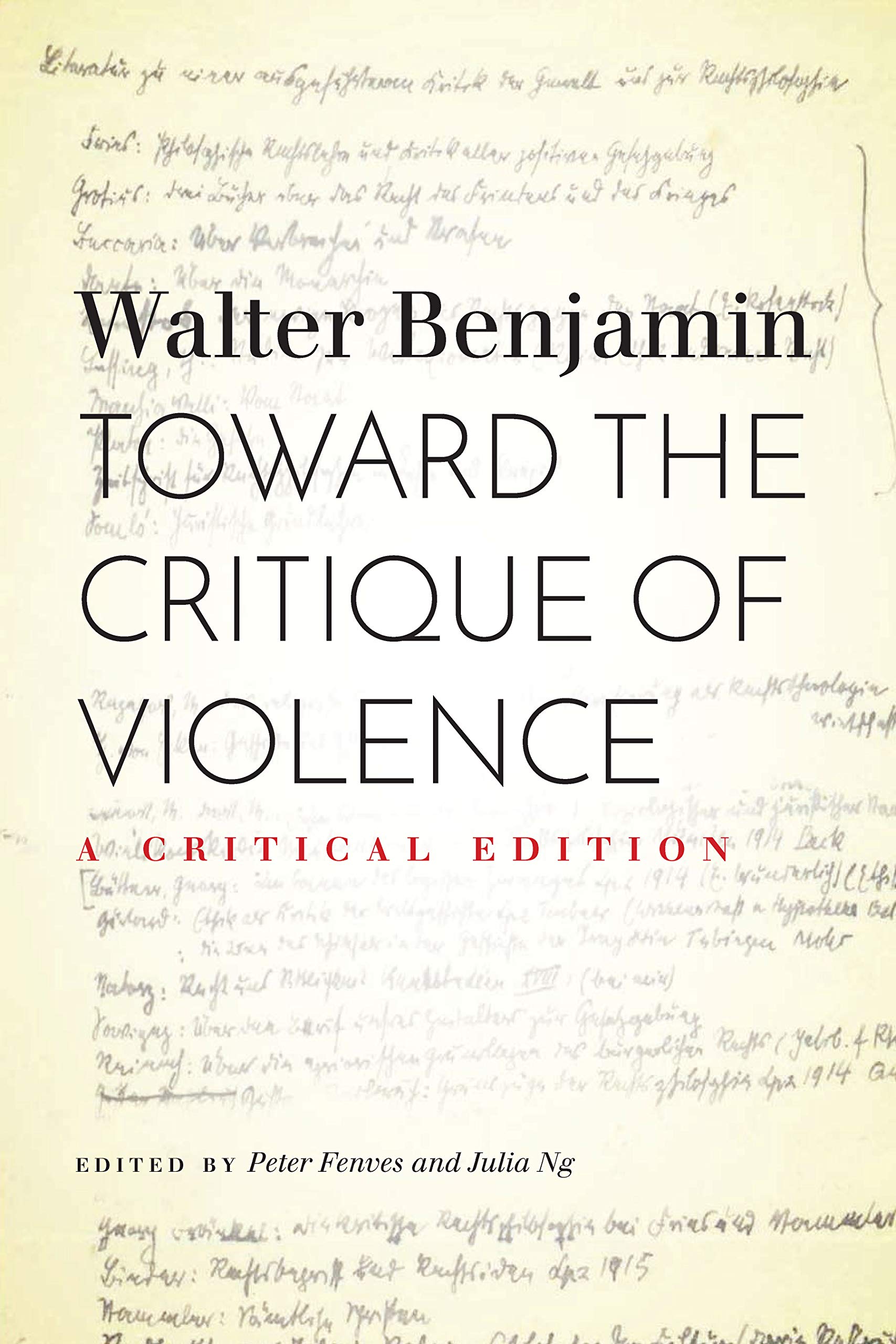

Toward the Critique of Violence: A Critical Edition
Walter Benjamin, Julia Ng, Peter Fenves
4.01(354 readers)
"Dieser Band vereinigt fünf Texte, die in einem inneren Zusammenhang stehen; sie zeigen die Entwicklung zentraler Motive von Benjamins Denken auf. Eingeleitet wird er durch eine sehr frühe Studie Über das Programm der kommenden Philosophie. Es folgen die Aufsätze Zur Kritik der Gewalt, wo Benjamins Schicksalsbegriff Gestalt gewinnt, und Schicksal und Charakter, eine Arbeit, die er selbst als ein Modell der ihm vorschwebenden philosophischen Theorie bezeichnet hat. In zwei Texten aus dem Nachlaß, den Geschichtsphilosophischen Thesen und dem Theologisch-politischen Fragment, kehren die Gedanken des frühen Benjamin wieder, auf einer anderen Stufe der Reflexion."
Publisher
Stanford University Press
Publication Date
6/22/2021
ISBN
9781503627680
Pages
344
Categories
About the Author

Walter Benjamin
Walter Bendix Schönflies Benjamin was a German Jewish philosopher, cultural critic, media theorist, and essayist. An eclectic thinker who combined elements of German idealism, Romanticism, Western Marxism, Jewish mysticism, and neo-Kantianism, Benjamin made influential contributions to aesthetic theory, literary criticism, and historical materialism. He was associated with the Frankfurt School and also maintained formative friendships with thinkers such as playwright Bertolt Brecht and Kabbalah scholar Gershom Scholem. He was related to German political theorist and philosopher Hannah Arendt through her first marriage to Benjamin's cousin Günther Anders, though the friendship between Arendt and Benjamin outlasted her marriage to Anders. Both Arendt and Anders were students of Martin Heidegger, whom Benjamin considered a nemesis.
Among Benjamin's best known works are the essays "The Work of Art in the Age of Mechanical Reproduction" (1935) and "Theses on the Philosophy of History" (1940). His major work as a literary critic included essays on Charles Baudelaire, Johann Wolfgang von Goethe, Franz Kafka, Karl Kraus, Nikolai Leskov, Marcel Proust, Robert Walser, Trauerspiel and translation theory. He also made major translations into German of the Tableaux Parisiens section of Baudelaire's Les Fleurs du mal and parts of Proust's À la recherche du temps perdu.
Of the hidden principle organizing Walter Benjamin's thought Scholem wrote unequivocally that "Benjamin was a philosopher", while his younger colleagues Arendt and Theodor W. Adorno contend that he was "not a philosopher". Scholem remarked "The peculiar aura of authority emanating from his work tended to incite contradiction". Benjamin himself considered his research to be theological, though he eschewed all recourse to traditionally metaphysical sources of transcendentally revealed authority.
In 1940, at the age of 48, Benjamin died by suicide at Portbou on the French Spanish border while attempting to escape the advance of the Third Reich. Though popular acclaim eluded him during his life, the decades following his death won his work posthumous renown.
Among Benjamin's best known works are the essays "The Work of Art in the Age of Mechanical Reproduction" (1935) and "Theses on the Philosophy of History" (1940). His major work as a literary critic included essays on Charles Baudelaire, Johann Wolfgang von Goethe, Franz Kafka, Karl Kraus, Nikolai Leskov, Marcel Proust, Robert Walser, Trauerspiel and translation theory. He also made major translations into German of the Tableaux Parisiens section of Baudelaire's Les Fleurs du mal and parts of Proust's À la recherche du temps perdu.
Of the hidden principle organizing Walter Benjamin's thought Scholem wrote unequivocally that "Benjamin was a philosopher", while his younger colleagues Arendt and Theodor W. Adorno contend that he was "not a philosopher". Scholem remarked "The peculiar aura of authority emanating from his work tended to incite contradiction". Benjamin himself considered his research to be theological, though he eschewed all recourse to traditionally metaphysical sources of transcendentally revealed authority.
In 1940, at the age of 48, Benjamin died by suicide at Portbou on the French Spanish border while attempting to escape the advance of the Third Reich. Though popular acclaim eluded him during his life, the decades following his death won his work posthumous renown.
Reader Reviews
Loading comments...